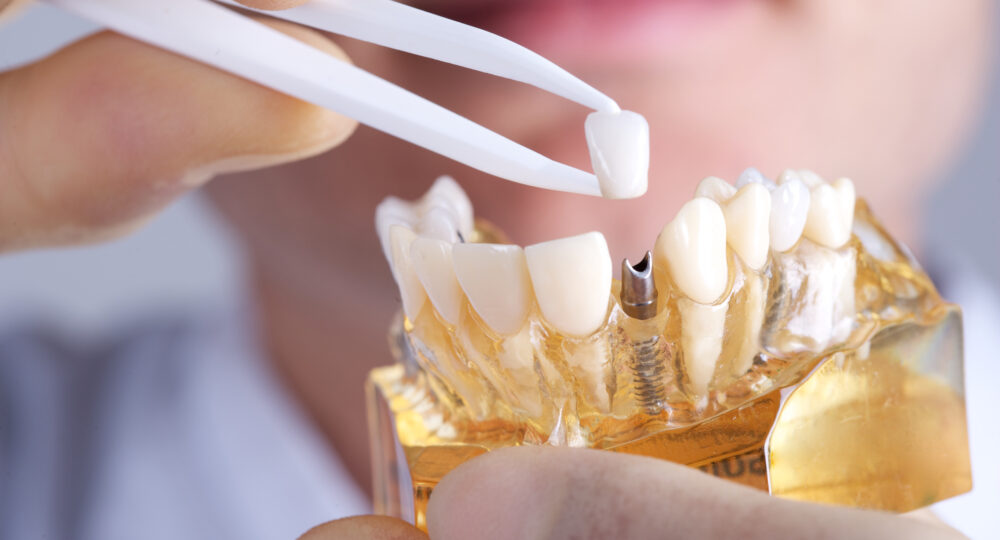How Dental Implants Can Significantly Improve Your Quality of Life

Most of us take great care in maintaining our pearly whites and dread the day of losing our teeth in old age or any other unforeseen circumstances. Missing teeth can drastically affect the way we think of ourselves and negatively impact our relationships with others. Fortunately, with advances in medical science, dental implants can restore our smile to its former self through minimally invasive surgery.
Having a full set of sparkling teeth is shown to boost confidence and speaks volumes about an individual. It is no wonder that our parents were so particular about brushing and flossing when we were growing up. Those of us who carried on maintaining good oral hygiene into adulthood have noticed its benefits in our professional and personal settings.
However, any set of circumstances may lead us to lose teeth– through cavities, decay, accidents. Do you hesitate to smile in front of your colleagues or for photographs? Maybe you’re embarrassed by your not-so-perfect smile. Dental implants can restore missing teeth with artificial ones that look and feel nearly identical to your natural ones.
What are Dental Implants?
Dental implants are titanium roots that take the place of missing teeth in your jawbone. The artificial metal root is inserted into the jaw and is topped by a crown that resembles a tooth in colour and appearance. The metal root sits firmly in place and serves as the anchor for the artificial ceramic or metal crown sitting on top.
Why Do You Need Dental Implants?
Dental implants serve to replace missing teeth. Having an incomplete set of teeth can affect people’s self-confidence and negatively impact one’s health and appearance. Moreover, with missing teeth, a person starts to chew differently, and as a result, the gums may shrink while the jaw may lose bone. Additionally, with the gap left in place due to missing teeth, surrounding teeth may shift out of place.
Are Dental Implants Right For You?
Generally, people with one or more missing teeth qualify for dental implants. However, certain conditions need to be met to qualify for the surgery. For example, a person needs to have:
- Reached full-growth in the jawbone area
- Have enough bone in the jaw to support dental implants
- Healthy oral tissues and other necessary criteria
Who Can Perform Dental Implant Surgery?
Dental specialists perform dental implant surgeries, and they are called periodontists or oral surgeons. On the other hand, specialists who install crowns, dentures and other similar fixtures are called prosthodontics.
What Is Involved In Dental Implant Surgery?
There are several steps involved in dental implant surgery:
- The damaged tooth is removed, and the jawbone is prepared for grafting if necessary
- The dental implant is placed, which is followed by bone growth and healing
- The abutment and artificial teeth are placed
The process from start to finish can take a couple of months. This is because sufficient time must pass for healing to occur and for the development of new bone in the jaw.
What Is Bone Grafting and Do You Need It?
In certain conditions, the patient’s jawbone may not be thick enough for dental implants. In such incidents, bone grafting is done to support the insertion of implants. Grafting helps provide the necessary support for the implant. Generally, it may take a few months for the transplanted bone to grow enough bone to support the implant.
Inserting the Dental Implant
In this procedure, the oral surgeon will cut into your gums to expose the jawbone. Following this, holes are drilled into the bone where the metal post will be placed. The metal post serves as roots for the tooth and, therefore, must be tightly secured in place. Following the metal root’s insertion, sufficient time must pass for the jawbone to grow over and fuse with the dental implant’s surface. This process can take several months.
The Abutment Is Placed
Once the above process is completed, the specialist will then place the abutment. The abutment is the connectivity material between the dental implant and the crown. To insert the abutment, the oral specialist will once again cut open the gums where the dental implant is placed and fix the abutment. Finally, the gum tissue is closed around the abutment. In some cases, the abutment is attached to the dental implant, and the patient will not require additional surgery.
The Dental Crown is Attached
The crown is crafted by taking impressions of the mouth and the surrounding teeth. The crown is only placed after it is determined that the jawbone supports the new tooth. There are several options for artificial teeth- they can be fixed, removable or a combination.
What happens After the Dental Crown Is Attached?
Usually, patients experience some discomfort following each stage of the process. Patients may experience some amount of swelling, bruising, pain or minor bleeding. In such circumstances, pain medication is prescribed, and if the problem persists, patients are advised to contact their dental specialists.
Additionally, immediately following each stage’s completion, patients are advised to eat soft foods while the site heals. Upon completing all procedures, you will need to maintain good oral hygiene and avoid bad habits such as chewing tobacco and regularly see your dentist.
Author’s Bio
Karthik Talwar is a content writer for BreezeMaxWeb that helps businesses showcase their brand through enticing copy. When he is not working, he enjoys exploring new places and trying new foods.
Leave a reply
You must be logged in to post a comment.






